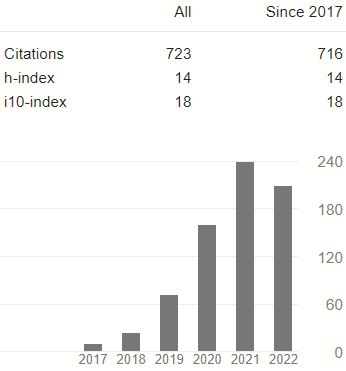PENGARUH PENGHINDARAN PAJAK TERHADAP NILAI PERUSAHAAN YANG DIMODERASI OLEH CORPORATE GOVERNANCE DAN KEPEMILIKAN MAYORITAS
DOI:
https://doi.org/10.25170/jara.v12i2.85Keywords:
Corporate Governance, Firm Value, Majority Shareholder, Tax AvoidanceAbstract
This study aims to provide empirical evidence about the effect of tax avoidance on firm value is moderated by corporate governance and majority shareholder. This study using a sample of 13 non-financial companies that listed on Corporate Governance Perception Index (CGPI) ranking list. This research uses 3 hypotheses. data were analyzed using multiple linear regression using SPSS 22.0 program. The results showed that tax avoidance has no significant effect on firm value, corporate governance that moderates tax avoidance affects the firm's value and the majority shareholder that moderates tax avoidance does not affect the firm's value.
References
Ariff, A. M. dan Hashim, H. A. (2014). Governance and the value relevance of tax avoidance. Malaysian Accounting Review, 13(2).
Asnawi, S. K. dan Wijaya, C. (2005). Riset keuangan: Pengujian-pengujian empiris. Jakarta: PT Graha Pustaka Utama.
Brigham, E. dan Houston, J. F. (2001). Manajemen keuangan I. Jakarta: Salemba Empat.
Chan, K. H., Mo, P. L. L. and Tang, T. (2016). Tax avoidance and tunneling: Empirical analysis from an agency perspective. Journal of International Accounting Research, 15(3), 49-66.
Chen, X., Hu, N., Wang, X. and Tang, X. (2014). Tax avoidance and firm value: Evidence from China. Nankai Business Review International, 5(1), 25-42.
Chen, S., Chen, X., Cheng, Q. and Shevlin, T. 2010. Are family firms more tax aggressive than non-family firms? Journal of Financial Economics, 95(1), 41-61.
Corporate Governance Perception Index Tahun 2014 tentang Laporan Hasil Riset dan Pemeringkatan. (2015). Jakarta: The Indonesian Institute for Corporate Governance.
Desai, M. A., and Dharmapala, D. (2006). Corporate tax avoidance and high-powered incentives. Journal of Financial Economics, 79(1), 145-179.
Desai, M. A., and Dharmapala, D. (2009). Corporate tax avoidance and firm value. The Review of Economics and Statistics, 91(3), 537-546.
Haruman, T. (2007). Pengaruh struktur kepemilikan terhadap keputusan keuangan dan nilai perusahaan. Simposium Nasional Akuntansi, XI. Pontianak.
Lestari, N., Wardhani, R., Anggraita, V. (2014). Pengaruh perencaaan pajak terhadap nilai perusahaan dengan moderasi corporate governance. Simposium Nasional Akuntansi XVII. Lombok.
Masripah, Diyanty,V. dan Fitriasari, D. (2016). Controlling shareholder and tax avoidance: Family ownership and corporate governance. International Research Journal of Business Studies, 8(3), 167-180.
Martani, D., Fitriasari, D., Yulianti. (2010). Influence of book tax gap towards earnings persistence and firm value for the period of 1999–2007. The 3rd Accounting & The 2nd Doctoral Colloquium Bridging the Gap between Theory, Research and Practice: IFRS Convergence and Application.
McGuire, S. T., Omer, T. C. and Wang, D. (2012). Tax avoidance: Does tax-specific industry expertise make a difference? The Accounting American Review, 87(3).
Prasiwi, K. W. (2015). Pengaruh penghindaran pajak terhadap nilai perusahaan dengan transparansi informasi sebagai variabel pemoderasi. Skripsi. Program Studi Akuntansi Fakultas Ekonomi dan Bisnis Universitas Diponegoro.
Salvatore, D. (2005). Managerial economics. Fifth Edition. Singapore: Thomson Learning.
Siregar, B. (2008). Pengaruh pemisahan hak aliran kas dan hak kontrol terhadap dividen. Jurnal Riset Akuntansi Indonesia, 11(2), 158-185.
Soejono, F. (2010). Pengaruh tipe kepemilikan terhadap profitabilitas perusahaan: Studi empiris di Bursa Efek Indonesia. Ekuitas, 14(2), 152-169.
Solomon, J. dan Solomon, A. (2004). Corporate governance and accountability. England: John Wiley & Sons Ltd.
Suandy, E. (2011). Perencanaan pajak. Edisi 5. Jakarta: Salemba Empat.
Wang, X. (2010). Tax avoidance, corporate transparency, and firm value. Disertation published. The University of Texas.
www.idx.com
www.sahamok.com
www.iicg.org
www.mitrariset.com
Downloads
Published
Issue
Section
License
Authors who publish with this journal agree to the following terms:
- Authors retain copyright and grant the journal right of first publication with the work simultaneously licensed under a Creative Commons Attribution-ShareAlike 4.0 International License that allows others to share the work with an acknowledgment of the work's authorship and initial publication in this journal.
- Authors are able to enter into separate, additional contractual arrangements for the non-exclusive distribution of the journal's published version of the work (e.g., post it to an institutional repository or publish it in a book), with an acknowledgment of its initial publication in this journal.
- Authors are permitted and encouraged to post their work online (e.g., in institutional repositories or on their website) prior to and during the submission process, as it can lead to productive exchanges, as well as earlier and greater citation of published work.














